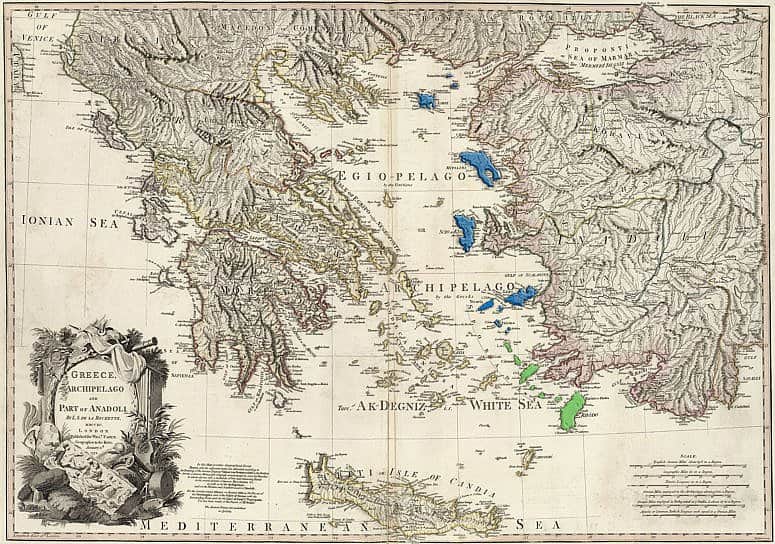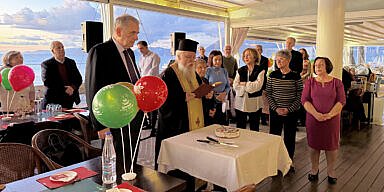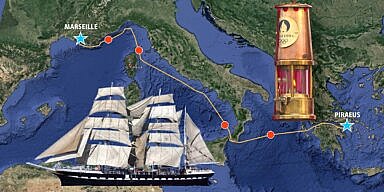How the Aegean Islands Escaped Returning to Turkey
It is almost axiomatic, to hear the typical Greek statement: “It’s all controlled by the Big Powers, we’re just little pawns.” Often this is used as a convenient excuse for the lack of taking internal responsibility for the affairs of Greece, by blaming others, but in the grand scheme of things, there’s quite a bit of truth in it. A real example of this truism has come from historical scholarship that has studied the diplomatic documents of the “Powers” before and during World War I, and it’s worth a brief discourse.
A little historical preamble: Just before World War I, the shrinking Ottoman Empire was further diminished by a combination of newly-found small countries, that had previously gained their independence by revolution, and were trying to expand their territories further. These conflicts have been labeled as “The Balkan Wars,” and among other lands, it had gained for Greece the islands near the coast of Turkey, such as Lesbos, Chios, Samos, Icaria, and others. (The Dodecanese islands, including Rhodes, had been previously wrested from Turkey by Italy, and remained under Italian jurisdiction.) In effect, by 1913, Turkey’s Aegean coast was ringed by islands controlled by others, much like today.
Even before the start of World War I, it is evident to diplomats that the war clouds were gathering, and already there were attempts at potential alliances and maneuvers to gain favorable positions for success. In those days, wars were not fought to the bitter end – no “unconditional surrender” terms such as in World War II – but when one side gained a significant advantage, peace terms were negotiated, with the loser typically giving up some territories, and paying financial reparations to the winner. So, as potential allies were bargaining with each other, their agreements contained clauses such as “what do I get if we win?”
The two warring camps were known as “The Triple Alliance” (Germany, Austria-Hungary, and Italy), also known as the “Central Powers” and “The Triple Entente” (Great Britain, France, and Russia.) Within the allied camps, each country had its own separate and individual national interests and goals, and had to balance the desire to win the war of course, yet not over-strengthen their allies, either – because, as is true even today, the allies of today may be the enemies of tomorrow! So, they kept a wary eye on their friends, as well as on their potential enemies.
Turkey was wooed* by both sides, because it was (and is) in a potentially strategic location: It controls the access to the Mediterranean from the Black Sea – much desired by Russia, even today – and had a standing army that could storm into the middle East, and block the Suez Canal – a key British lifeline at the time. So, we now come to the “wooing” part that affects our story.
The Turkey of those days was controlled by a revolutionary group, known as “The Young Turks,” who had effectively done away with the power of the traditional Sultan, who had become a mere figurehead. They were unsophisticated and extremely nationalistic; however, their leaders were sharp negotiators. They were mainly under the influence of the Germans, but not controlled by them. So, when negotiating to enter the “Triple Alliance,” they demanded that, if they were to join, and if the war was successful, they should “get back” all the lost islands along their coast, plus be deeded back the Dodecanese islands, that had been taken from them by Italy.
So, one can imagine a scenario in which Turkey joined the “Triple Alliance” under those agreed conditions, World War I was concluded quickly and positively for them, and when the spoils were being divided, these islands would revert to Turkey! This is without consulting the tiny little new kingdom of Greece, of course!
As it happened, the diplomatic documents revealed that Germany thought that giving back the islands was a reasonable price to pay for involving Turkey into the war, whose army would either be sent South to block the Suez Canal and annoy the British or at least divert some enemy military units away from the Western Front being fought in France.
But Austria-Hungary vetoed the deal because, from its perspective, the idea of taking the Dodecanese islands away from the Italians would/may focus them toward their other ambitions, which were aimed North, at the Tyrol, a bone of contention between Italy and Austria-Hungary.
What’s essential in all this is that these Powers did not give a fig for Greece, or about the Greeks on the islands, nor the islands themselves. Still, they were focusing on their own broader war aims, and so the impact of their decisions on Greece’s future was incidental.
As an aside, it’s interesting to contemplate what may have happened to Russia, if the Germans had not pulled the brilliant coup – to send Lenin into Russia, on a special train, so that he would agitate them from within. As we know, he fermented the Communist Revolution, which took Russia out of World War I. If this had not occurred, it’s almost sure that as the spoils of that war – in which Turkey finally participated on the losing side – Russia, being on the winning side, would have gained the much-desired Eastern Thrace, including Constantinople and the strategic Dardanelle straights. The World would look much different today.
*Sadly, this was also the time when Turkey was conducting what is now known as “The Armenian Genocide.” The diplomatic documents of both sides (British, Germans, Austrians, even Americans) indicate that this was well known. Still, their interest was focused on obtaining the Turkish alliance and army, and they had opted only to make mild inquiries and feeble protests on the issue, so as not to alienate the Young Turk government that may make it choose “the other side.” So, the fate of small nations or people rides on the national interest of big powers.



